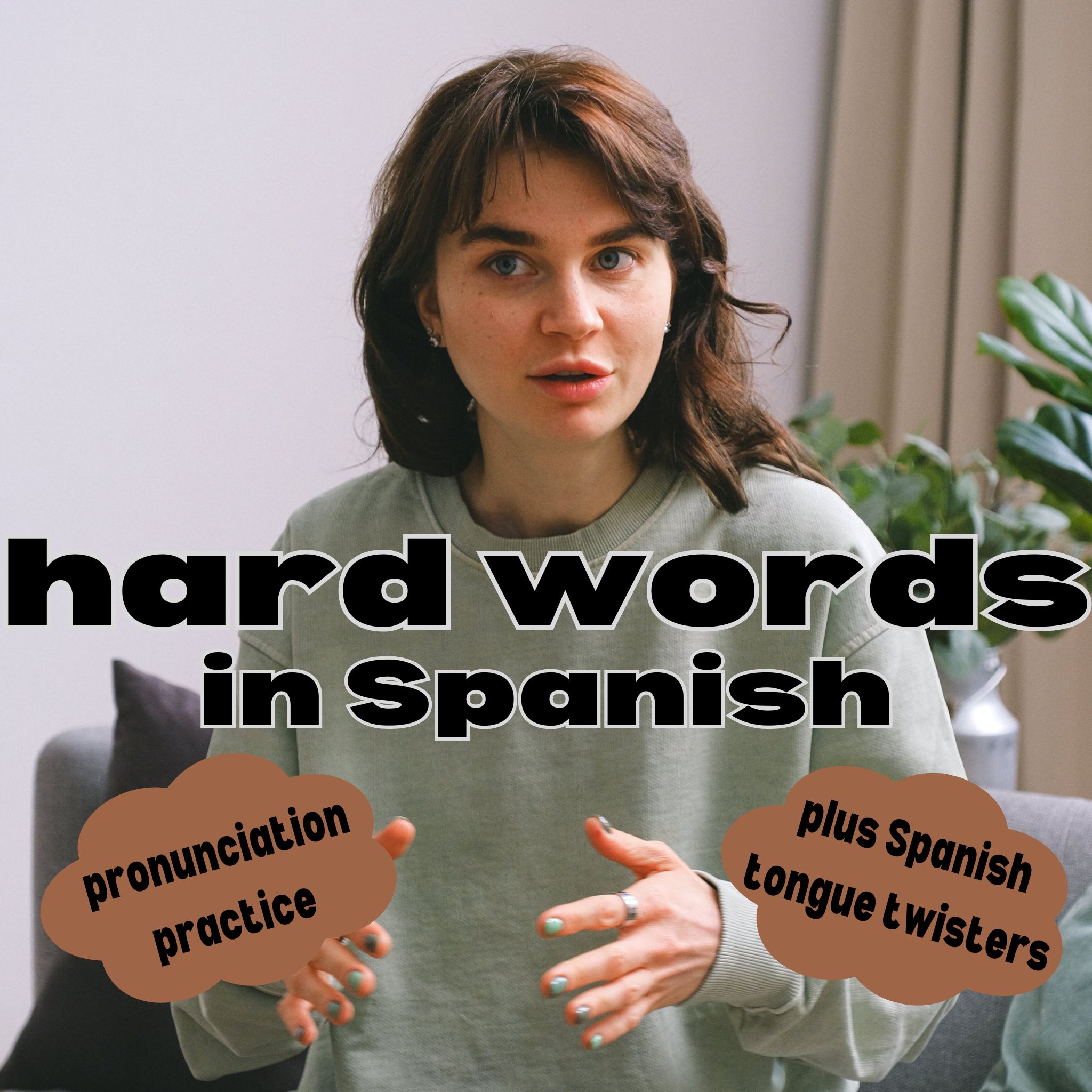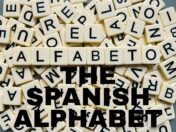The hardest words to pronounce in Spanish (with bonus tongue twisters!)

Get our free email course, Shortcut to Conversational.
Have conversations faster, understand people when they speak fast, and other tested tips to learn faster.
More infoSpanish pronunciation is supposed to be easy, right? This is especially true compared with English, since the letters in a word are always pronounced phonetically, exactly as they’re spelled. Still, even if you can usually sound things out, there are plenty of hard words in Spanish!
That’s why today’s post is devoted to some of the most difficult Spanish words to pronounce, with pointers for each one on how to overcome those difficulties. Once you’ve given your mouth some good pronunciation practice with all the hard Spanish words we introduce, we’ll end with a set of Spanish tongue twisters to remind you that difficult pronunciation in Spanish is all relative!
Tackling all these hard words in Spanish will not only improve your oral skills, it will also help you sound like a pro in spoken Spanish. Now let’s dive in and see the most difficult Spanish words to pronounce!
Hard words in Spanish
We’ve picked 15 difficult Spanish words that we’ll present here, working our way gradually from relatively easy to most difficult. These words cover the range of Spanish pronunciation challenges that learners generally need practice with, so if you master each one you should be able to apply these same pronunciation skills on any other complicated Spanish word. We explain the difficult factors for each word, from accents to vowel combos to sheer length.
We’ll also recommend some of our other posts that have specific lessons to help you overcome the challenges you’ll encounter here:
The Spanish alphabet (with audio)
Pronunciation in Spanish
Accent marks in Spanish
Syllables in Spanish
Silent letters in Spanish
Difícil / Fácil
Hard / Easy
We’ll start off easy with our hard Spanish words, with these two that you probably already know. We include fácil and difícil because learners often stress them on the wrong syllables. The key to the proper pronunciation of these two hard Spanish words is to stress them on the syllable with the accent mark, whereas beginners tend to stress them on the last syllable. The proper stress is /di/FÍ/cil and /FÁ/cil/.
Verde
Green
Verde may appear simple at first, but the combination of /r/ followed immediately by /d/ makes pronunciation fairly difficult for any Spanish learner. You need to first roll the /r/, and then immediately press your tongue against your front teeth to pronounce the /d/.
Tarde
Late
Tarde is another very common word with the same challenge as verde. We know it’s a difficult maneuver for your tongue to get the /r/ and /d/ right, but it’s definitely worthwhile to be able to pronounce these hard Spanish words correctly!
Ronronear
To purr
Ronronear is one of the hardest Spanish words to pronounce because of the succession of different /r/ sounds: it includes strong /r/ sounds at the beginning and in the middle, and a soft /r/ at the end of the word. We’ll go into how to pronounce the /r/ in our next word.
In addition to the three /r/ sounds, ronronear includes the vowel combination /ea/, which also often presents problems for students.
Ferrocarril
Railroad
Among the most difficult Spanish sounds for English speakers are /r/ and /rr/. So how do we pronounce a single /r/ or double /rr/ in Spanish?
Let’s start with the single /r/. Our tip is to first make the sound /d/ in English. Do you feel where your tongue touches the roof of your mouth? Now scoot it back to what’s called the alveolar ridge, a bit farther behind your teeth. Now just hit that spot very quickly with your tongue, and you’re making the single /r/ sound in Spanish.
So what about the double /rr/ sound in Spanish, that we need twice in ferrocarril? You just have to pronounce the single /r/ sound, but in rapid succession. Can you do this double tap to get a full /rr/ sound? The key is to essentially tense the rear half of the tongue while letting the tip go slack, and pass a bit of air through to let it bounce off the alveolar ridge.
For a full pronunciation lesson, check out our post on how to roll your Rs in Spanish. Mastering this double /rr/ sound takes some practice, but it’s worth it!
Aeropuerto
Airport
We’ve picked aeropuerto as one of the hardest Spanish words to pronounce because it contains so many vowels in succession. Since this is a common Spanish word for travelers, it’s a good one to practice in order to master the tricky dipthongs /ae/ and /ue/.
Agujero
Hole
The pronunciation of the three consonants /g/, /j/, and /r/ is what makes this a difficult Spanish word. The letter /g/ here is pronounced like the letter g in the English word “good”. Then, the /j/ is aspirated like the English letter h, as in “hero”. Finally, the letter /r/ is a soft /r/ between two vowels.
Jirafa
Giraffe
The challenging aspect of this hard word in Spanish simply lies in avoiding the temptation to pronounce it as you would in English. Although jirafa appears very similar to giraffe, since they both have the same Arabic roots, we pronounce them very differently in Spanish and English. Be sure to enunciate the /j/ like your English h, and don’t forget to pronounce the vowel /a/ at the end of jirafa.
Idea
Idea
You may be wondering why we include idea among our difficult words in Spanish, since the spelling is exactly the same as in English. Well this is exactly the reason, since just like with with jirafa, many English speakers tend to pronounce idea in English rather than in Spanish!
The key to proper pronunciation of this word, and with all the vowels in Spanish, is to just pronounce the vowels as they appear. We explain the specifics of vowel combos in our post on syllables, but in this case the /e/ and /a/ are each pronounced independently.
Murciélago
Bat
The length of this four-syllable word shouldn’t be a problem, yet its pronunciation still poses a challenge. Murciélago is especially interesting for Spanish students because it has all five vowels in it! It’s a great opportunity to practice the pronunciation of all the Spanish vowels at once in one single word.
Vergüenza
Shame
This word may appear strange for many Spanish learners because of the diéresis, which is the accent composed of two dots right above the letter /u/.
The explanation is that normally, when we have the letter combinations /gue/ or /gui/, the letter /u/ is silent. However, as is the case with vergüenza, the letter /ü/ with the diéresis indicates that it needs to be distinctly pronounced.
Desafortunadamente
Unfortunately
Desafortunadamente is a relatively common word in everyday Spanish, but many Spanish learners find it difficult to pronounce correctly since it’s such a long word. We can totally understand, since desafortunadamente has eight syllables!
For any hard word in Spanish that has so many syllables, we suggest you start by slowly pronouncing each syllable individually. Keep repeating it, while gradually increasing your speed: /De/ /sa/ /for/ /tu/ /na/ /da/ /men/ /te/.
Otorrinolaringólogo
Otorhinolaryngologist
An otorhinolaryngologist is a doctor who specializes in the ear, nose, and throat, so in English you often just refer to the specialist as an ENT. In Spanish, however, the only word we have for this is otorrinolaringólogo. So for anyone needing this type of doctor, you’d better learn how to pronounce it correctly!
Whether you’re trying to master this word’s English or Spanish pronunciation, try the same method of slowly pronouncing each syllable that we described for desafortunadamente.
Esternocleidomastoideo
Sternocleidomastoid
This word is one of the longest words in the Spanish language, and it may even be the hardest Spanish word to pronounce. Esternocleidomastoideo is a nine-syllable word! In addition to its length, this word is challenging because it contains some interesting vowel combinations such as /ei/ and /oi/.
Sternocleidomastoids are the big muscles on either side of our necks that allow us to move our heads around. Although this may not be a word you’ll normally use in everyday conversation, it’s still a fun one worth learning and repeating for the sake of practice. You’ll definitely impress your Spanish-speaking gym buddies if you mention your esternocleidomastoideos and pronounce it correctly!
Spanish Tongue Twisters
Now that you’ve had such a range of pronunciation practice with all our hard Spanish words, your mouth and tongue are in great shape for even more linguistic challenges. Are you ready to give these Spanish tongue twisters a try?
We consider tongue twisters a very powerful tool, not only for linguistic purposes but also for entertainment! We even have a dedicated post we can recommend, with even more Spanish tongue twisters.
We’re sure that if you try the ones we share here, they’ll not only challenge your tongue and vocal muscles, but also improve your articulation of difficult words in Spanish, boost your confidence when speaking the language, and provide you with plenty of fun and enjoyment!
So here’s your challenge: go ahead and read each of these Spanish tongue twisters out loud, repeating them as many times as it takes for you to effortlessly pronounce them without any errors!
1. Erre con erre cigarro, erre con erre barril, qué rápido corren los carros cargados de azúcar del ferrocarril. – R and R cigar, R and R barrel, how fast the sugar-loaded railroad cars run.
2. Pablito clavó un clavito en la calva de un calvito. – Pablito nailed a nail on the bald head of a bald man.
3. Tres tristes tigres tragaban trigo en un trigal en tres tristes trastos. – Three sad tigers ate wheat in a wheat field on three sad plates.
4. El perro de San Roque no tiene rabo, porque Ramón Rodríguez se lo ha robado. – The dog of San Roque has no tail, because Ramón Rodríguez has stolen it.
5. Pepe Pecas pica papas con un pico. – Pepe Pecas chops potatoes with a pickaxe.
6. El cielo está enladrillado, ¿quién lo desenladrillará? El desenladrillador que lo desenladrille, buen desenladrillador será. – The sky is bricked up, who will unbrick it? The unbricker that unbricks it will be a good unbricker.
Conclusion
Mastering the Spanish language comes with its own set of challenges, particularly when it comes to pronunciation. This post has aimed to address these difficulties by providing a fun list of the most challenging Spanish words to pronounce.
With each of the hard Spanish words we explored, we offered tips and techniques to help overcome their particular hurdles. If you’ve succeeded in correctly enunciating all of them, you’ve covered the majority of the language’s pronunciation challenges that can be applied to any other difficult words in Spanish.
To give you even more pronunciation practice, we ended our post with a fun series of Spanish tongue twisters. Between those and each of the hardest words to pronounce in Spanish, today’s post has surely helped you improve your oral skills and confidence in the Spanish language!



